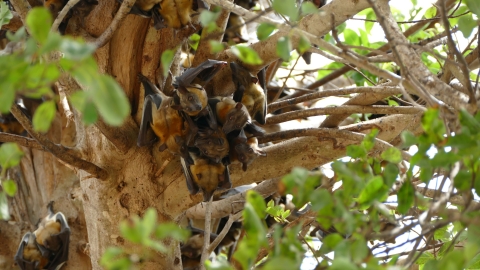
Bucknell’s Reeder Co-authors Paper Disputing Bats' Role in Human Disease
November 15, 2023
A new paper, co-authored by Professor DeeAnn Reeder, biology, disputes the belief that African bats are responsible for transmitting harmful viruses that affect humans. Photo by Natalie Weber
A new paper authored by an international team of biologists, virologists and conservationists — including Bucknell University Professor DeeAnn Reeder, biology — challenges the prevailing narrative that African bats are the origin of a number of harmful viruses affecting humans.

Professor DeeAnn Reeder, biology. Photo by Emily Paine, Marketing & Communications
Published today online by the journal Biology Letters, the paper provides a comprehensive review of published studies and finds little substantial evidence, outside of the Marburg and Sosuga virus, that African bat species serve as reservoirs or bridging hosts for viruses that directly can spillover to humans and cause significant disease.
Bats have frequently been portrayed as carriers of numerous dangerous viruses that are passed onto humans. However, the research team — led by Natalie Weber, a research scientist at the Max Planck Institute of Animal Behavior in Germany — conducted an exhaustive and critical examination of available literature, specifically focusing on viruses detected in bats in Africa. They reviewed 162 papers published between 1978 and 2020 and, based on data from over 80,000 individual bats from more than 167 bat species, did not find substantial evidence that any bat species, other than the Egyptian rousette, played a central role in the transmission of viruses to humans in this region.
"The aim of our study was to provide a balanced and evidence-based assessment of the available knowledge regarding bat viruses and their relevance for the transmission of viruses from bats to humans in Africa," Weber says. "Through meticulous review and analysis, we found no compelling evidence to support the prevailing narrative that bats harbor a large number of viruses that are transmitted to humans. On the contrary, our findings reveal only two bat-virus systems in which transmission is clearly documented."
The researchers systematically assessed the available data and determined which bat species were sampled, how often and from what country, if they were lethally sampled or not, what metadata were collected, and which viruses were detected with what methodology. The outcome of these analyses challenges not only the scientific community but also the wider public perception of bats, emphasizing the importance of evidence-based understanding.
"The findings highlight the need for a more nuanced and informed approach to public discourse surrounding the role of wildlife in disease emergence," says Reeder, a noted scholar on bats and disease transmission to humans who has been conducting a study on African bats and the Ebola virus. "The authors thus propose a scheme to aid standardized evaluation of virus hosts in the future and call for greater interdisciplinary collaborations in bat-virus studies."
The paper's review also revealed that bat misidentifications and outdated species assignments were likely common in published studies on viruses. The researchers conclude that species identification is of great importance for follow-up investigations, especially when a particular bat is determined to host a virus of interest. Besides, bats are often regarded as a singular entity, but it is crucial to acknowledge the substantial diversity within this group, which has evolved over tens of millions of years. Africa alone hosts no less than 324 different bat species.
As global concerns about emerging infectious diseases persist, the researchers hope that their work will contribute to a more accurate understanding of the complex dynamics between wildlife, particularly bats, and human health. Their study also raises concerns about the impact of reiterated research communication linking bats and viruses, based on missing evidence, on the public perception of bats, as well as human-bat conflicts and bat conservation efforts.
"The implications of this research extend beyond Africa, encouraging a more thoughtful and evidence-based approach to the study of zoonotic diseases worldwide," Reeder says.

